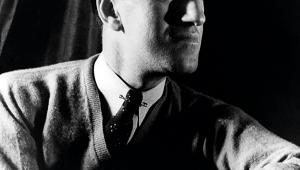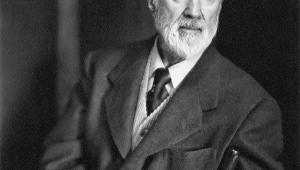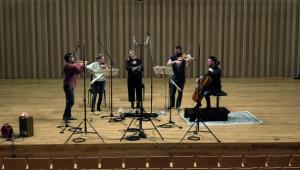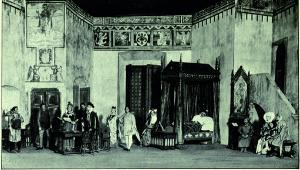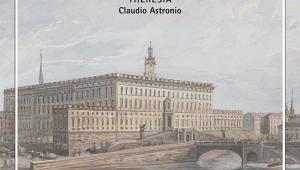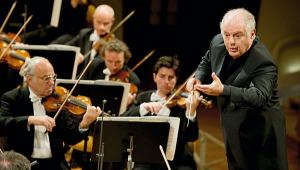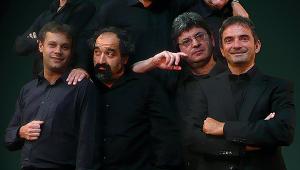Schubert 'Trout' Quintet
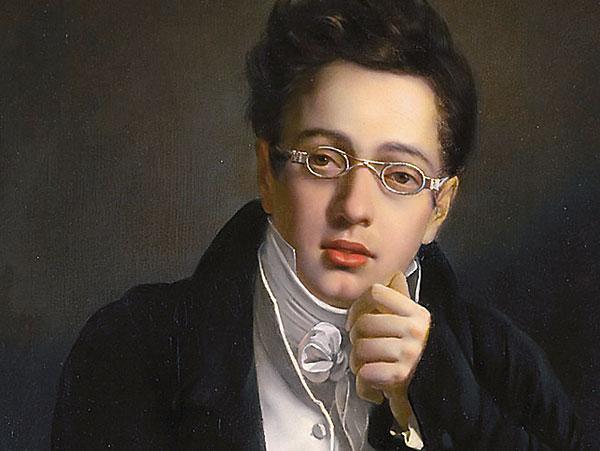
Growing up in a one-room apartment in an overcrowded district northwest of the Ring, pupil then assistant to his schoolteacher father, Schubert was Viennese born and bred, a city boy with even more reason than Beethoven to seek pleasure and solace in the surrounding countryside. Lacking time or resources for more refined pursuits, Schubert in his early 20s relaxed principally by drinking (coffee and alcohol, both to excess), smoking (likewise) and walking.
Song Without Words
In the early summer of 1819, Schubert and his friend the singer Johann Michael Vogl left Vienna for a trip to Upper Austria. They visited the Benedictine monastery of Kremsmünster and then walked on to Vogl's birthplace, the town of Steyr, where they found lodging at the home of an acquaintance, Sylvester Paumgartner. It was Paumgartner, an amateur cellist, who suggested to Schubert that he compose a quintet, and especially some variations on his song Die Forelle ('The Trout', from 1817) which had become a favourite among the composer's circle of friends. Schubert set to work in haste, to judge from formal aspects of the finished Quintet such as the slow movement – 60 bars of music heard twice, the second time simply transposed and tailed with the briefest of codas – and the repeat-heavy outer movements.

There are few notable precedents for the 'Trout' Quintet. The piano quartets of Mozart treat the ensemble in concerto-like fashion with the keyboard placed first among equals. A more direct model was a quintet written by Johann Nepomuk Hummel in 1802 (published in 1822 as Op.87 but widely circulated in manuscript copies) in which the double-bass takes the place of the second violin in the standard string quartet foundation.
This serves to reflect the compass of the piano in the string writing and to cast a spell of rustic good humour. Bearing a closer musical resemblance to the 'Trout' is Hummel's D minor Septet Op.74 which he then arranged in 1816 for the same quintet disposition with double-bass. So much for influences: the 'Trout' Quintet in turn became the blueprint for instrumental pieces inspired by the music and mood of a song, which in Schubert's case culminated in the 'Death and the Maiden' String Quartet of 1824.
The Second Violin Sonata of Brahms and Second Symphony of Mahler are two further examples of much larger pieces growing out of a five-minute song. Placed fourth in the sequence of five movements, the 'Trout' theme and variations which give the Quintet its name also set the mood of carefree contentment which is scarcely absent for more than a minute or two.
Swimming Upstream
Musicians and listeners alike tend to bask in such contentment, and only confirmed curmudgeons are likely to come away from a performance picking at the bones of the 'Trout' Quintet. The work's discography is long and distinguished, inspiring loyalty to this pianist or that felicitous lineup. There are few recorded 'Trouts' which have either gone off with age or should never have been dished up in the first place, though the latest DG version [4797570] does not invite second helpings. This is an object example of celebrity-casting gone wrong, with Anne-Sophie Mutter, Daniil Trifonov and their colleagues stabbing at accents and rarely allowing a phrase or episode to settle, recasting the piece in the mould of late-style masterpieces such as the String Quintet.
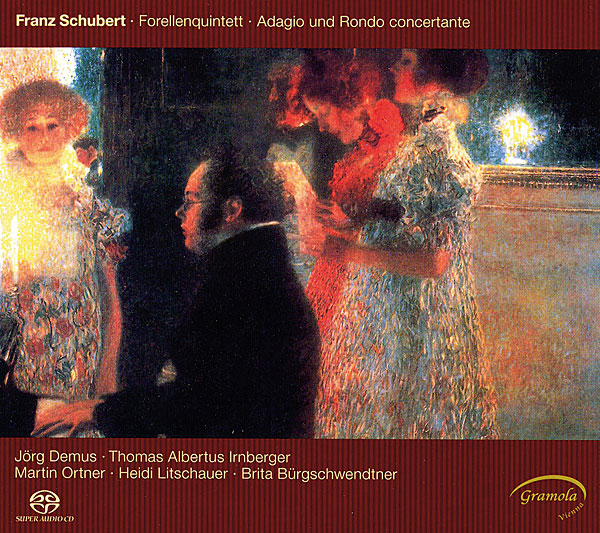
Cultivating a grand Brahmsian manner at the other extreme, two great Russian pianists of the postwar era on beautifully open LP repressings: Emil Gilels with the Amadeus Quartet [DG, 4798119] and Sviatoslav Richter with the Borodin Quartet [EMI/Warner, 9029587186]. The close DG engineering captures fingerboard noise as if from a front-row seat, but also exposes the Amadeus making heavy weather of the quicker fourth-movement variations. Richter and the Borodins, on the other hand, never quite escape the echo of a Soviet-era empty-hall acoustic.
Moving closer to the work's spiritual home, a less self-consciously polished performing tradition for the 'Trout' Quintet begins with Artur Schnabel and the Pro Arte Quartet in 1935 [Warner, 9029563376]. Timeless highlights include the Scherzo's stamping gait, the sighing portamento and string vibrato in the Andante and Variation movements.
All these elements are apparently natural and effortless, and emulated by Rudolf Serkin (pupil of Schnabel's contemporary Fritz Busch) in his two accounts on disc, of which the second [CBS/Sony, 5128722, download only] was unrivalled in the work's stereo discography for its simplicity and modesty of expression until Serkin's son Peter made another pair of recordings.
Easily found on a variety of streaming services but only on CD as part of Peter Serkin's complete RCA albums [RCA/Sony, 19439713872], both these versions take their place as the culmination of an émigré-German school in which the pianist leads by the example of restraint rather than bravura.
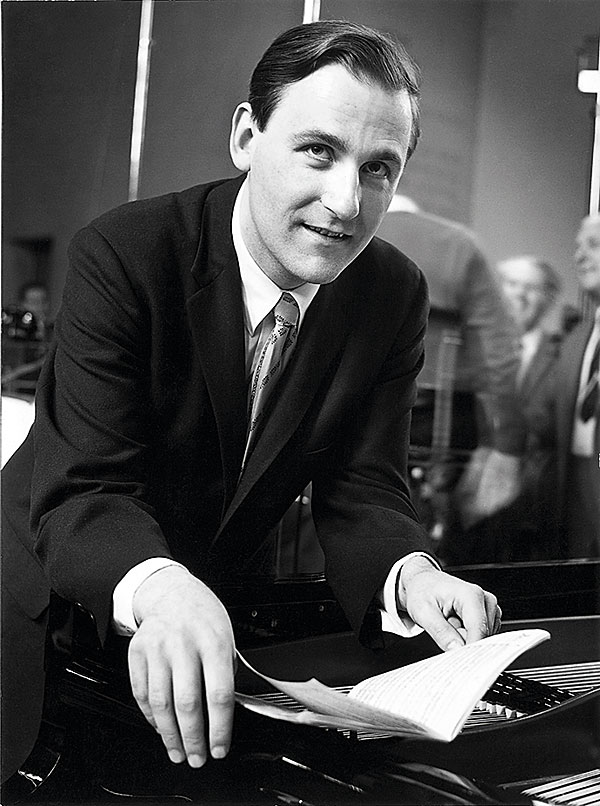
Alfred Brendel and the Cleveland Quartet might have continued the tradition, but their over-emphatic Philips version [4767283] cedes to Brendel's digital-era remake [see Essential Recordings below]. The 'Trout' came from Vienna, and there it has always swum most happily, from the early '50s stereo of Paul Badura-Skoda and the Barylli Quartet [Westminster/DG, 4798195, download only] through to Elisabeth Leonskaja and the Alban Berg Quartett [EMI/Warner, 5176442] in high-impact digital sound. Among the Vienna Octet's many lineups and recordings over half a century, the Decca version from 1957 with pianist Clifford Curzon [4674172, download only] still reigns supreme.
Period Pieces
Gently lifted rhythms, golden-mean tempi, slender upper-string tone and a more active role for the double-bass mark out Viennese performances from their rivals, but the best period-instrument recordings share these qualities. Steven Lubin's fortepiano is resonant across the registers but nicely placed behind the strings, and coupled with Die Forelle itself [L'Oiseau-Lyre/Decca, 4338482, download only] sung by John Mark Ainsley.
The veteran Max von Egmond also does the honours on a little-heralded version by the Dutch-English period musicians of the Atlantis Ensemble [Musica Omnia, MO0212, download only] which deserves a place on anyone's shelf for the unusually democratic balance and superbly characterful lower-string playing. They take all the repeats Schubert wrote and bring a smile to every bar.

